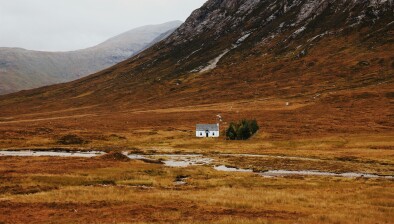‘Right to Live’ can work with current laws, Community Land Scotland argues

Josh Doble
Community Land Scotland has responded to claims that its suggestion that people should have the Right to Live in a community to which they have an established connection is impractical and could clash with existing legislation.
Last month, the charity called on politicians to establish a ‘Right to Live’ for young people growing up in rural communities in the face of an “acute” shortage of affordable housing in those areas.
One of six asks included in the charity’s vision for a flourishing Scotland through community ownership by 2034, the declaration asks that the “Scottish Government acknowledges the Right to Live in Your Community. This can be supported by a National Community Wealth Fund to fund community housing projects. Alongside legislative levers to free up land for housing through the lotting mechanisms and Sites of Community Significance in the Land Reform Bill.”
The policy drew criticism from Holmes Mackillop director Craig Donnelly who questioned both the practicality and the thinking behind the idea.
“The proposal will have significant practical difficulties,” he said last week. “And as a child of a father who was in the armed forces and who relocated regularly throughout my childhood, I’m not sure this proposal would give me the right to live anywhere.”
Mr Donnelly added: “In addition, Community Land Scotland’s proposal could clash with the Human Rights Act which protects the right to peaceful enjoyment of possessions, including the right to sell them to whoever the owner chooses.
“I’m unconvinced that this proposed additional deterrent is practical. Rather, I think the shortage of affordable properties in rural areas would be better tackled by addressing the lack of social housing and insufficient investment and infrastructure in rural communities.”
Responding to Mr Donnelly, Community Land Scotland policy manager Josh Doble told Scottish Housing News that the Right to Live proposal works within, and not against, existing legislation
He said: “The freedom to private property, detailed under the European Convention on Human Rights, is not an absolute right. It is always subject to the public interest.
“In other words, private ownership of land and buildings can be interfered with if that ownership is not meeting the public interest, for example restricting other people’s access to housing.
“This is a widely accepted legal reality and is the basis of land reform legislation and compulsory purchase powers which already exist.
“The Right to Live which we have proposed extends to anyone with a connection to a particular geographic community and goes beyond growing up in a place to include things such as local employment.
“This follows existing legislation, for example in relation to homelessness, which sets out provisions for ‘local connection’.”
Mr Doble also sought to change the perception that a Right to Live is just applicable to young people.
He added: “A Right to Live in your community is not just about young people, although unsurprisingly this has caught attention due to the particular challenges young folk face staying in their respective rural communities.
“A Right to Live is about ensuring that local housing stock is used to meet local needs and that those who want to live, work and contribute to local communities are able to do so.
“Whilst housing which sits empty and land which sits idle is brought back into productive use to meet community aspirations and help create resilient rural places.
“Greater regulation of ownership of land and buildings is needed to sit alongside greater investment in rural communities and infrastructure.
“They are two sides of the same coin. The carrot and the stick both need to be used when trying to address the market failure which has resulted in the rural housing crisis.”








